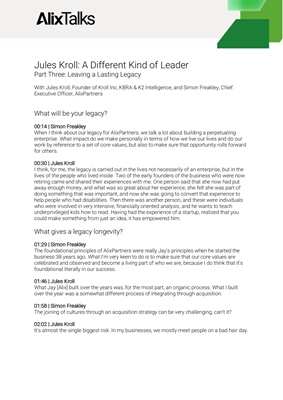
Jules Kroll: A Different Kind of Leader
Part Two: Creating a Positive Culture
With Jules Kroll, Founder of Kroll Inc, KBRA & K2 Intelligence, and Simon Freakley, Chief
Executive Officer, AlixPartners
How does leadership inform corporate culture?
00:15 | Jules Kroll
It's important for an individual as well as an enterprise to mean something, and to stand for
something.
00:21 | Simon Freakley
I agree, and I think often people confuse leadership and management. Both are important, but
I personally think that leadership is a lot about standing for something, and having values that
people understand. And that they're constant values, so they sort of know where you're going
to go with decisions because the values shine through.
00:39 | Jules Kroll
Number one thing: have an environment where people believe that the leaders of the business
care about them. Make it a point when you know somebody has suffered a loss, there's an
illness, when there's been a mistake. If people believe that you care about them as individuals,
good things will happen.
What are some of the obstacles to building a positive culture?
01:05 | Jules Kroll
The leadership of the firm should not be greedy. Situations where you have CEOs making 200
times what the lower paid employees do - that, to me, is an absolute sign of disrespect.
01:21 | Simon Freakley
Sometimes when I see these wonderful mission statements of companies, clients that we
work with, that are not connected with what the leaders in the business do day-to-day, then it's
sort of for nothing. It isn't just the chief executive or the chairman, it's the people on the front
line - the managing directors, the directors, the team leaders. Unless they're really living the
culture, then these, in my experience, tend not to be the most successful companies.
01:42 | Jules Kroll
It's almost easier with newer businesses because you're starting with fresh pieces of clay. It's
more difficult in the context of an acquisition or a merger. The toughest thing is to get two or
more cultures to be integrated in an effective way.
What informs your championing of diversity?
02:02 | Jules Kroll
The earliest impact, personally, was when I was the only white baseball player on a police
athletic league baseball team in South Jamaica, Queens. We would play teams from other